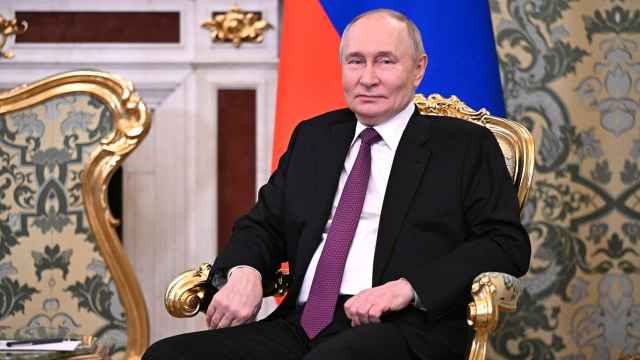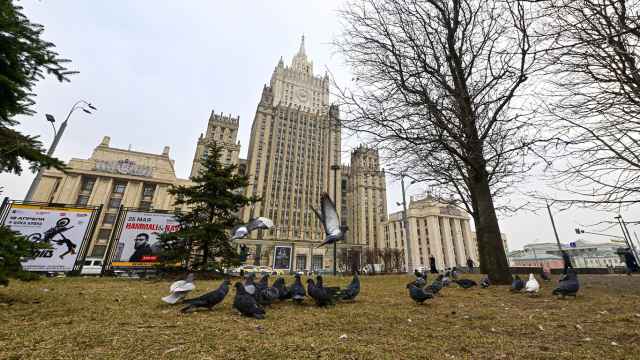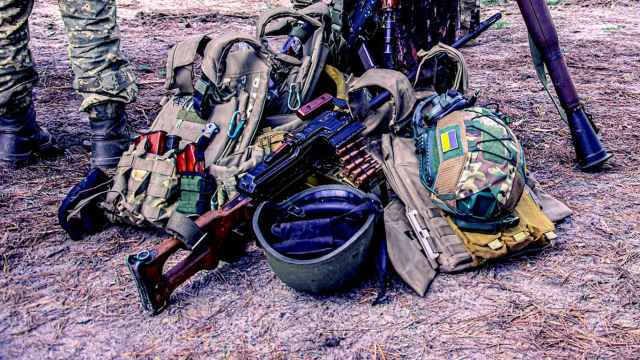The Federal Security Service deported a prominent British reporter from the country, raising fears of a new crackdown on foreign journalists.
Luke Harding of The Guardian newspaper was stopped at passport control after arriving at Domodedovo Airport last Saturday, briefly locked in a cell and then put on the next flight to London without any explanation, he wrote on his Twitter blog late Monday.
An officer with the Federal Border Service, an FSB unit, merely told him: "For you Russia is closed," The Guardian reported in an article published Tuesday. His valid visa was annulled.
In an unexpected about-face, the Foreign Ministry said Tuesday that Harding could continue to work in the country if he picks up his correspondent's accreditation.
"If he is interested in working in Russia … and if he observes the rules, there will be no problem for him returning," the ministry said in a statement.
The ministry accused Harding of violating "a whole series of rules," but named only one: that he failed to pick up his accreditation letter before leaving Moscow in late November.
Diplomats said the ministry's attempt to downplay the issue was a positive signal.
"This looks like a genuine offer to try and fix this," a diplomatic source told The Moscow Times, requesting anonymity because of the sensitivity of the issue.
But The Guardian said Tuesday that the newspaper is "baffled by the statement issued by the Russian Foreign Ministry today."
"We have still not received an adequate explanation of why Luke Harding was deported," the paper said.
The case caused bewilderment because it was unclear why Harding was singled out and it seemed that not even the Foreign Ministry, responsible for accrediting foreign correspondents, knew what was going on.
When Britain's Foreign Secretary William Hague contacted Foreign Minister Sergei Lavrov on Monday afternoon, Lavrov could offer no explanation and only promised to look into the matter, The Guardian said.
The head of the ministry's consular department Andrei Karlov also confessed ignorance Tuesday by telling reporters that he does "not know the reason why Luke Harding was not let into Russia," RIA-Novosti reported.
Even Prime Minister Vladimir Putin's spokesman admitted that he did not know the reason. "We are trying to find out what happened," Dmitry Peskov told The Moscow Times.
But an unnamed law enforcement source told RIA-Novosti that Harding was put on a blacklist of undesirable foreigners. He was denied entry "upon demand from one Russian structure," the source was quoted as saying.
The scandal threatened to jeopardize still-fragile Russian-British relations as both governments are working hard to improve ties, which fell to record post-Cold War lows after the assassination of Kremlin critic Alexander Litvinenko in London in 2006.
Lavrov plans to pay a visit to London next Tuesday where he is now expected to face tough questions on the expulsion.
Harding, who had been based in Moscow since 2007, was working on the diplomatic cables published by WikiLeaks during the past two months, raising speculation that the ban was a punishment for those reports.
The Guardian was one of five Western publications that were given early access to the material, published from Nov. 28 onward. A Dec. 1 story authored by Harding was titled "Alexander Litvinenko murder 'probably had Putin's OK.'"
His troubles started just weeks earlier when the Foreign Ministry summoned him to a meeting. Officials told him that visas for him and his family, due to expire at the end of November, would not be renewed "due to technicalities."
"At one point we were told that we would have to leave within days," his wife Phoebe Taplin said Tuesday.
The situation was defused when the ministry gave them a six months' extension so that their two children could finish the school year, she said.
The family then spent the Christmas break in Britain and had no problems with the border guards when they returned with the children in January, Taplin said. Harding had a valid visa until May 31, but remained in London to work on a book on The Guardian's collaboration with WikiLeaks.
After his deportation Saturday, The Guardian sought help through diplomatic channels, leading to a phone conversation between Lavrov and Hague. Only after this proved futile did the newspaper go public with the matter.
Harding wrote on his Twitter that his expulsion is "still a mystery" and it seemed that "Kremlin people [are] more scared of me than I am of them."
"The Russians have been unhappy with my reporting for a while," he wrote, adding that WikiLeaks "may have been the final straw." "Extremely sad to leave Russia under these circumstances," he added.
The Guardian's editor Alan Rusbridger said the expulsion would have serious implications for press freedom. "Russia's treatment of journalists — both domestic and foreign — is a cause of great concern," he said in a statement.
Observers said the case highlighted the FSB's tactics of barring unwanted foreigners without explanation.
Security analyst Andrei Soldatov said Harding was just the latest example in a string of expulsions.
"Under Putin, the FSB returned to KGB methods of dealing with foreign journalists," Soldatov wrote on his Agentura.ru web site.
Recent cases include British journalist Thomas Pirani, who was refused entry in 2008 in what seemed retaliation for his reporting on trade union issues.
In 2006, Thomas de Waal, a former Moscow Times reporter who now works for the Carnegie Endowment, was refused a visa when he wanted to present his book about the Karabakh conflict.
The Czech Republic has been hit three times with journalists' expulsions over the past 10 years, including two correspondents for Czech television whose visas were not renewed, Czech Embassy spokesman Ondrej Soukup said.
Another prominent case is Natalya Morar, a Moldovan national who was banned in December 2007 after authoring numerous muckraking reports about corruption in the Kremlin for the Moscow-based New Times magazine.
Leonid Gozman, a co-founder of A Just Cause, a liberal opposition party with Kremlin ties, said these cases were an absolute disgrace for the authorities.
"It seems that this happens when somebody very powerful feels personally offended. But it is very dangerous to make decisions on the basis of emotions and stupid to expel people without any explanation," he said.
Editor's note: An earlier version of this article incorrectly described William Hague as "the Hague" upon second reference. All references to Hague should have been to Mr. Hague, the British foreign secretary.
A Message from The Moscow Times:
Dear readers,
We are facing unprecedented challenges. Russia's Prosecutor General's Office has designated The Moscow Times as an "undesirable" organization, criminalizing our work and putting our staff at risk of prosecution. This follows our earlier unjust labeling as a "foreign agent."
These actions are direct attempts to silence independent journalism in Russia. The authorities claim our work "discredits the decisions of the Russian leadership." We see things differently: we strive to provide accurate, unbiased reporting on Russia.
We, the journalists of The Moscow Times, refuse to be silenced. But to continue our work, we need your help.
Your support, no matter how small, makes a world of difference. If you can, please support us monthly starting from just $2. It's quick to set up, and every contribution makes a significant impact.
By supporting The Moscow Times, you're defending open, independent journalism in the face of repression. Thank you for standing with us.
Remind me later.






